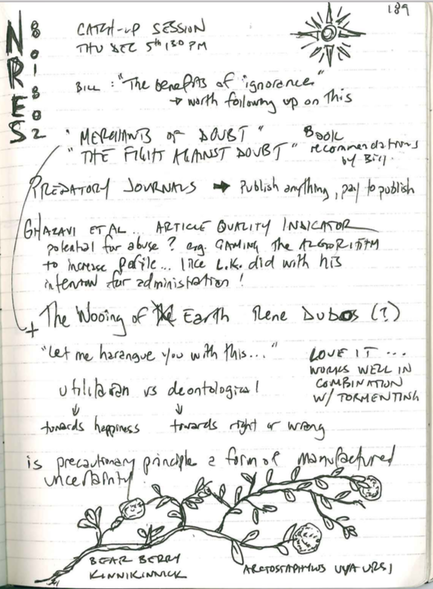Our final class discussion moved through some student-selected topics that we did not get to before UNBC job action interrupted our semester. One of these topics was about collaboration between industry and and academia, another on data-dredging and salami slicing (stretching the same data over multiple studies and papers), and manufactured uncertainty.
Sadly, the tactics for manufacturing uncertainty identified by Boan et al (Boan et al. 2018. From Climate to Caribou: How Manufactured Uncertainty Is Affecting Wildlife Management. Wildlife Society Bulletin 42(2):366–381) are too familiar to anyone who pays attention to environmental issues:
This brings me back to questions of neutrality and whether science can withstand politicization. Wouldn't it be great if our political culture was such that politics took on the burden of asking whether or not it can withstand scientification. In other words, political decisions would have to go through a scientific review process similar to the function provided by the Canadian Senate. To be fair, Senate Committees regularly call in experts to testify, including scientists, but I like the idea of this being a more formal arrangement. Alas, this plan is as subject to bias and corruption as any other, so perhaps we are best served by there being an ongoing dialogue, even if it is strained, between scientists and politicians about who should decide the best course of action on environmental issues.
One other gem from the class was a comment from Dr. McGill about the benefits of ignorance... this topic has always intrigued me, particularly as it relates to the unwillingness of otherwise intelligent people to engage on environmental issues. A personal version of Boan et al's tactics for manufacturing uncertainty has become the new normal for large swaths of our society, perhaps adding "too difficult" the list. I once learned a phrase in Latin (I remember it as difficultatis patrocinia praetexis segnitae) that translated as "we make a pretext of difficulty to rationalize sloth." Could be an epithet for the age we live in.
Sadly, the tactics for manufacturing uncertainty identified by Boan et al (Boan et al. 2018. From Climate to Caribou: How Manufactured Uncertainty Is Affecting Wildlife Management. Wildlife Society Bulletin 42(2):366–381) are too familiar to anyone who pays attention to environmental issues:
- deny the problem exists
- vilify your critics
- deny the source of the problem
- claim the problem is too costly to resolve
This brings me back to questions of neutrality and whether science can withstand politicization. Wouldn't it be great if our political culture was such that politics took on the burden of asking whether or not it can withstand scientification. In other words, political decisions would have to go through a scientific review process similar to the function provided by the Canadian Senate. To be fair, Senate Committees regularly call in experts to testify, including scientists, but I like the idea of this being a more formal arrangement. Alas, this plan is as subject to bias and corruption as any other, so perhaps we are best served by there being an ongoing dialogue, even if it is strained, between scientists and politicians about who should decide the best course of action on environmental issues.
One other gem from the class was a comment from Dr. McGill about the benefits of ignorance... this topic has always intrigued me, particularly as it relates to the unwillingness of otherwise intelligent people to engage on environmental issues. A personal version of Boan et al's tactics for manufacturing uncertainty has become the new normal for large swaths of our society, perhaps adding "too difficult" the list. I once learned a phrase in Latin (I remember it as difficultatis patrocinia praetexis segnitae) that translated as "we make a pretext of difficulty to rationalize sloth." Could be an epithet for the age we live in.

 RSS Feed
RSS Feed